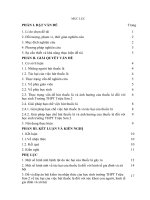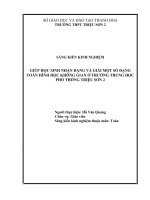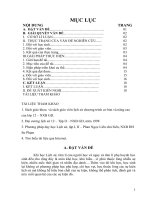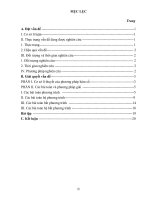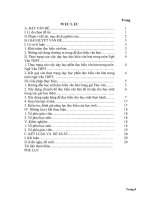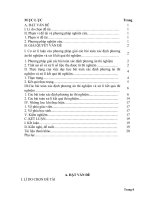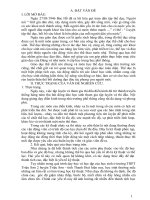SKKN Sáng kiến kinh ngiệm Role plays and simulation in teaching English speaking skill
Bạn đang xem bản rút gọn của tài liệu. Xem và tải ngay bản đầy đủ của tài liệu tại đây (181.01 KB, 19 trang )
TABLE OF CONTENTS
A.INTRODUCTION
PAGE
I. REASONS FOR CHOOSING THE RESEARCH
2
II. AIMS OF THE RESEARCH
3
III. SCOPE, OBJECT AND RESEARCHING METHOD
3
B. MAIN CONTENT
4
I. GENERAL INTRODUCTION
4
1. Some principles of using and managing role-plays:
4
2. Steps in carrying out role-plays:
5
2.1 Outside the classroom
5
2.2 Inside the classroom
5
II. APPLYING THE RESEARCH IN TEACHING
5
Unit: 1 FRIENDSHIP (11)
5
Version: 1
1. Materials
5
2. Purpose and Audience
5
3. Target Language
5
4. Warm up
5
5, Role play
6
Unit: 1 FRIENDSHIP (11)
Version: 2
13
1. Introduction
13
2. Preparation
14
3. Procedure
14
III. RESULT AFTER APPLYING THE RESEARCH IN TEACHING
16
C. CONCLUSION
17
D. REFERENCE BOOKS
18
1
A. INTRODUCTION
I. REASONS FOR CHOOSING THE RESEARCH
The introduction of the new textbook “English 11” into teaching at Trieu Son
2 High School in 2006 has marked real renovation in language teaching and
learning from the traditional approach-grammar translation met
hod, which only concentrates on the ability of using grammar rules precisely, to
communicative approach, which focuses on communication ability. Nonetheless,
the teachers of English at Trieu Son 2 High School find it difficult to teach
speaking successfully because of the class size, the students’ language level, and
additionally, students are not acquainted with CLT. Moreover, the majority of the
teachers were trained under the strong influence of the Grammar-Translation
method, which impedes them from teaching speaking successfully even the new
textbook follows the communicative approach.
As a teacher of English at Trieu Son 2 High School in Thanh Hoa, I often
receive similar questions from many students. For example, “I can understand
grammar and sentence structures well, but I feel embarrassed to talk in English” or
“What should I do to speak English well?” In my reality of teaching, there are a lot
of students who have perfect knowledge of grammar that works wonderfully for
reading and writing but cannot express themselves to the teachers. On the other
hand, I often hear a lot of complaints from the colleagues: “Students seem so quiet
and lazy during speaking lessons. It is very difficult to make them participate in
speaking activities”. Therefore, the idea of doing something useful for my
colleagues and students has urged me to conduct the research.
Another reason why the study was carried out lies in my love for teaching
speaking. By doing the study, I can know more about the challenges in teaching
and learning speaking skills so that I can find relevant techniques along with
activities to improve my teaching speaking at Trieu Son 2 High School.
2
The above reasons have inspired me to conduct a study on “ role-plays and
simulations in teaching English speaking skill” with the hope to make a little
contribution to the quality of teaching and learning speaking skills for Grade 11th
at Trieu son 2 High School
II. AIMS OF THE RESEARCH
To introduce the using role-plays and simulations and to show the
advantages of using role-plays and simulations
To show how to organize role-plays and simulations effectively and how to
deal with initial problems that may arise.
To show how using role-plays and simulations can be used for various
classroom activities.
To give teachers confidence in using using role-plays and simulations
themselves.
III. SCOPE, OBJECT AND RESEARCHING METHOD
Scope : Researching in the process of teaching English at Trieu Son II high
school.
Object: This subject is concerned with ways of organizing activities in the
class.
Researching method: Reading reference books , discussing with other
teachers, applying in teaching, observing and drawing out experiences.
3
B. MAIN CONTENT
I. GENERAL INTRODUCTION
1. Some principles of using and managing role-plays:
- The more engaging the better. The value of role-plays come from students
immersing themselves in the material.
- Choose a 'hot' topic and stage a debate. Assign students positions on the topic
(for/against). This will get students out of their personality and into the role where
they do not have the same inhibitions.
- Preparation is very important to success. Give students 'personality cards' which
sketch out their personal characteristics or scenario. Divide students into groups
and give them time to sketch out various scenarios, and go over extra or special
vocabulary, ask them to discuss how they will act, think about the character and
plan what they will say. For example, what are possible responses/replies for the
angry neighbor?
- The teacher, as facilitator of the role-play must support students in their role, i.e.
they 'are' in the backyard arguing over the fence. Don't do anything to interrupt the
pretend environment. Leave grammar correction to the end. Correcting students in
the middle of an argument interrupts the pretend environment. Make notes and do
a debriefing after.
- Exaggeration is good! Encourage students to exaggerate their actions, opinions
and movements. Exaggeration helps students immerse themselves in the role.
- Stage a rehearsal first. Have students practice their role in small groups with
coaching from the other students.
- While the role-play or debate is in progress, have other students suggest
vocabulary first, and act as backup if they do not know.
Role-plays are unpredictable which makes them both a valuable learning tool and
at the same time difficult to manage. Sketch out the various routes the role-play
can take from the initial scenario. This will give you some idea what to expect
and avoid any surprises.
4
Role-plays can range from 30 minutes to one hour.
2. Steps in carrying out role-plays:
2.1. Outside the classroom:
_ Choosing the topic, based on the topic of the lesson or the main grammar point
of that lesson.
_ Preparing materials, especially role-play cards (Teachers can make up the cards
themselves, or search for them on the Internet)
2.2 Inside the classroom:
_ Providing students with enough language to be used in their role-plays.
_ Setting up the scene for role-plays.
II. APPLYING THE RESEARCH IN TEACHING
Unit 1: FRIENDSHIP (11)
Version 1
Finding a Perfect Roommate/Flatmate Role-play
1. Materials:
+ Ranking Roommates: Vocabulary Warm-up
+ Room Ads: Listening Reading Comprehension Warm-up
+ Rooms for Rent Role Cards
+ Friends Looking for Rooms Role Cards
+ Students with Rooms for Rent Activity Sheet
+ Students with Friends Needing Rooms Activity Sheet
2. Purpose and Audience:
The purpose of these materials is to get the students to practice talking about the
qualities of good and bad roommates.
3. Target Language:
Describing people and their habits.
4. Warm up:
a) Group Discussion
+ Where do you live?
5
+ Do you live in a dormitory or with your family?
+ Who do you live with?
+ Are you happy where you live? Why or why not?
b) Pros and Cons Brainstorm
+ What do you think about shared accommodation?
+ What are the pros and cons of shared accommodation?
·
2 groups divided into Pros and Cons
·
then pair up Pro and Con to discuss
c) Which would you choose?
In groups of 3, put Shared Accommodation Ads in pile face down. Students turn 1 up
and explain to the group.
This accommodation is in (area).
It’s a (flat/house/townhouse)
There are (number) people living there.
It costs $____ a week.
(other information)
Would you like to live there? Why or why not? – Discuss
After going through all six ads, choose the best one for you and explain why.
The Perfect Flatmate
What kind of person is good to live with? Why?
Ranking Exercise:
In groups, students circle the ideal qualities of roommates using the Ranking
Exercise Vocabulary Sheet and then rank them in order of importance.
5. Role-play
Set-up:
The class is divided into two groups:
Group 1: These students have a room for rent at their house because a
roommate has just moved out. They will need a Room for Rent Role Card and a
Room for Rent Activity Sheet.
6
Group 2: These students have a friend who is looking for a place to live. They will
need a Friends Looking for a Place to Live Role Card and a Students with Friends
Needing a Room Activity Sheet.
The students should be given some time to read their role cards, ask questions
about vocabulary and then write down the concerns (from the role cards) into the
table headings (on the activity sheets).
Divide the class chairs into two lines facing each other (or if you like, have an
inner circle and outer circle). One line is for students with rooms to rent (Group 1)
and the other line is for students who have friends who need a place to live(Group
2).
Group 1 students approach group 2 students and ask them if the group 2 students
know anybody who needs a place to live. Group 2 students tell them they have a
friend who is looking for a place. Group 2 will then ask questions to make sure
that their friend will be happy in the shared accommodation. Group 1 students
then ask questions about the friend to make sure that the friend is compatible.
Wrap up
Students discuss which friends were compatible with which houses.
Shared Accommodation Ads
Room to rent in a townhouse complex.Flat to Share! $110 - Room with built
Neat, tidy and very relaxed. Complexin wardrobes in a spacious chic
has pool, spa and tennis court. Niceapartment! We are two fab chicks
area, central to everything. 2 guys livinglooking for a third chic in her early
there already, seeking a relaxed, easytwenties to share our 3 bedroom
going, reliable guy or girl. Rent is $100apartment. We'd like someone who is
a week plus $200 bond + electricity. Forchilled, laidback, up for a laugh, tidy,
any questions or an inspection contactclean and loves to party.... If your
Ryan on 0413 418 290
interested
give
me
a
call
on
0424426577
7
Room
For
Accommodation,
Rent,
Student Shared Accommodation in 2 bedroom /
fully
furnished 1 bathroom unit to share unit with one
room, swimming pool, gym, close to other. Centrally located 5 minutes walk
Griffith
University
Campus,
bus to the town centre and public transport.
transport available This would suit 25years+ Female- Asian Student, Nonmature male International student smoker, quiet, clean, neat and tidy to
(Asian welcome) or working person share with friendly working Australian
130.00 AUD per week, non smoker. professional. Rent $130 per week (incl
Close to university area, available bills)-4weeks
bond.
Enquiries
to
now, Ph 55-7447700 or text 0402-90- Virginia.
5215
Unfurnished Bdrm with own bthrm Looking to share luxury large unit 5
avail. in 3brm furnished townhouse to mins to University.
Will have own
share with working female. Looking bathroom, security parking and pool. I
for someone to take over lease in late am a 21 student and would like to share
April. Townhouse has converted with female around my own age. Must
garage, which could be used as be clean and reliable. Rent $160 p.w.
storage. Pool and BBQ area in $480 Bond. Please give me a call
complex. $140/week
Vanessa 0416678485
8
When trying to find a compatible
roommate, what qualities are the most
important for you? Circle the qualities
of your ideal roommate. Finally, in
groups, rank them below. (1 being the
most important and 12 being least
important).
messy (is a slob)
good cook
can’t cook
outgoing
shy
easygoing
argumentative/high strung
boring
humorous, interesting
smoker
non-smoker
heavy drinker
social drinker
non-drinker
friendly
grumpy/mean
quiet
noisy
considerate
selfish
has a car
doesn’t have a car
broke
has enough money
9
How are you as a roommate? How many of the above ideal qualities do you
have?
In your group, find out who is the most compatible roommate for you:
Students With Friends Who Need Housing
Your friend Susan is looking for a
Your friend Bill is looking for a
place to live.
place to live.
Facts about Susan
Facts about Bill
She is an outgoing person who likes to
He is easygoing and gets along well
party. And so she can be quite noisy,
with other people. He is a bit lazy and
especially on the weekends. She is a
somewhat messy.
heavy drinker but she doesn’t smoke.
He plays in a band so he often practices
She has a dog. She has a job so she has
the drums at home. He doesn’t smoke.
lots of money.
He is a social drinker. He’s a little
broke so he wants to find a place with
cheap rent.
Concerns (Questions to Ask)
(1) Are pets ok? (She has a dog)
(2) Are
the
other
roommates
friendly outgoing people? (Her
last roommate was a bore so she
moved out).
(3) Does anybody smoke? (She’s
allergic to cigarette smoke).
(4) How much is the rent?
(5) How far is the apartment from
the school?
Concerns (Questions to Ask)
(1) Will it be Ok if he practices the
drums from time to time? (He
plays in a band).
(2) Are there any cats or dogs at the
apartment? (He’s allergic to
animal hair)
(3) How much is the rent?
(4) How far is the apartment from
the school?
(5) Are the other roommates easy to
Your friend Brenda is looking for a
get along with?
Your friend John is looking for a place
place to live.
to live.
Facts about Brenda
Facts about John
10
She is a med student so she studies
He is very shy, so he doesn’t have
very hard. She has a scholarship so she
many friends or go out a lot. He is
has no problems with money. She
clean. He is quiet. He smokes, but he
doesn’t drink. She doesn’t smoke. She
rarely drinks. He has a job so he has
has a cat. She is very tidy.
lots of money.
Concerns (Questions to Ask)
Concerns (Questions to Ask)
(1) Is it a quiet house? She’s a med
(1) Is smoking allowed in the house?
student so she needs to study
(2) How much is the rent?
hard.
(3) Are there any cats or dogs at the
(2) How much is the rent?
apartment? (He’s allergic to
(3) Does anybody smoke? (She’s
animal hair)
allergic to cigarette smoke).
(4) How far is the apartment from
the school?
(4) Is the apartment clean? (He is a
bit of a neat freak).
(5) How far is the apartment from
(5) Are pets ok? (She has a cat)
the school?
Students Looking for Someone to Share Housing
One of your roommates has recently
One of your roommates has recently
moved out so you need to find a new
moved out so you need to find a new
roommate.
roommate.
Facts about the current roommates:
Facts about the current roommates:
The people living at the house now are
The people living in the house are
sociable, outgoing students at the
easygoing. They like to make a lot of
university. They have parties or go out
noise in the evening either playing
on the town at least once a week.
guitars or listening to music. There are
There are no smokers at the house and
no pets in the house. Everybody in the
no pets. The rent is $300 per month.
house smokes. They rarely drink. The
The house is about 10 minutes from
rent is about $200.00 and the house is
the university by foot.
about 20 minutes from the university
by subway.
11
Concerns about potential roommate:
Concerns about potential roommate:
(1) Is _________ sociable? (They
(1) Does _________ have a pet?
like to have fun now and then).
(2) Does _________ smoke? (One
of the current roommates is
allergic to smoke).
(The landlord doesn’t allow cats
or dogs at the apartment).
(2) Is _________ easy to get along
with?
(3) Is _________ clean? (The last
roommate was a slob).
(The
last
roommate
caused many fights).
(3) Is _________ a heavy drinker?
(4) Can _________ afford to pay
rent? (The last roommate still
owes them about 2 months
rent).
(The last roommate drank a lot
and caused problems).
(4) Does _______ mind noise? (The
other roommates tend to make a
lot of noise in the evenings)
One of your roommates has recently
One of your roommates has recently
moved out so you need to find a new
moved out so you need to find a new
roommate.
roommate.
Facts about the current roommates:
Facts about the current roommates:
They are quiet, clean hardworking
They are mostly studious, but like to
students. Most of them
are on
have fun from time to time. There are
scholarship so they don’t like to party
no pets in the house, but several
much. The rent is about $450. The
roommates smoke. The place is clean.
apartment is about 15 minutes from
The rent is $300 per month. The house
the university by bus.
is about 10 minutes from the university
Concerns about potential roommate
by bus.
(1) Is _________ quiet? (The last
Concerns about potential roommate:
roommate was way to noisy so
(1) Does _________ have a pet?
it was hard to study).
(2) Does _________ smoke? (One
(One of the current roommates
is allergic to cat hair).
12
of the current roommates is
allergic to smoke).
(3) Is _________clean? (The last
roommate was a slob).
(4) Does _________ have money
problems? (The rent is quite
(2) Is _________ quiet? (The other
roommates are serious students).
(3) Is _________ clean? (The last
roommate was a slob).
(4) Does
smoking?
_________
(Several
mind
of
the
expensive).
roommates smoke).
Unit 1: FRIENDSHIP (English 11)
Version 2
Matchmaking Roleplay
Duration: 15–20 min
Aim:
Oral fluency practice
Requirements:
Lots of space
Summary: Each student is given a "child", and tries to pair him/her up with
a suitable partner.
1. Introduction
The students are initially organised into groups, with each group member
receiving a different information card describing their son or daughter. But the
actual speaking is done on a one-to-one basis, with the students mingling in their
group and talking to the other "parents".
Groups contain 8 to 10 students, so this mingling requires a classroom with lots of
space, and preferably no desks to obstruct movement.
2. Preparation
Print enough copies of ten_singles.doc so that each student can receive one
information card.
Optionally, use a different colour of paper for each set of information cards.
3. Procedure
If the information cards are all white, then the teachers need to organise the
students into groups of 8 or 10 first (ideally an even number, otherwise one poor
child will miss out on a husband or wife). If we have a different colour for each set
13
of information cards, then we can simply hand out the cards as you wish, and get
the students to form groups according to the colours after they have read the card.
Explain that we are going to give each student a son or daughter! Tell them to read
the card and imagine what the person is like: do you think they are romantic?
Friendly? Humourous? Hard-working?
Give out the cards and allow some time for reading. (If there are some
groups of eight, simply give them four male and four female information cards).
Explain that the students can add extra details that aren't on the card. For example,
does your child have a car or a motorbike? Is he/she clever? To encourage this,
give the students an extra minute to think of one detail to add.
Now explain that each person should talk to the "parents" of potential
husbands/wives. They should only speak to one person at a time. Once they have
heard about all the potential partners, students should agree on how to match them
up. Check:
•
If you have a daughter, who do you talk to? (parents of sons)
•
Do you talk in a group, or in pairs? (pairs)
•
If you have a daughter, then do you have to speak with
everyone in your group who has a son? (yes)
•
When you have spoken to everyone, what do you do? (agree on
the couples)
If some groups finish early, you can tell them to think of reasons why the couples
they have matched up are suitable.
Have a feedback session at the end, perhaps writing the results on the board.
Your son, Tony, is a young doctor
Your daughter, Sue, works at a
who often works long hours at the
restaurant.
hospital. He is a quiet, thoughtful
because she likes talking to people.
person.
But she also wants to get married and
Your son, Paul, enjoys many sports
have a child.
Your daughter,
She enjoys her job
Julie,
owns
a
14
such as football, basketball, and
bookshop and is often very busy.
mountain climbing. He works for a
Although she is young, the workers
small company.
He would like a
respect her, and she is very generous
wife, but not children.
Your son, David, has an important
to them.
Your daughter, Jenny, is studying
job at the bank. Your family is quite
chemical
rich, so David is used to good clothes
university.
and expensive holidays.
restaurants, watching movies, and
Your son, Martin, has a job as a
travelling.
Your daughter, Ingrid, is a shy girl
gardener but he thinks his work is
who works at a nearby factory. She’s
boring. In his spare time he paints,
an excellent piano player, and usually
and enjoys reading poetry.
Your son, Edward, is studying
plays for at least an hour every day.
Your daughter, Emma, is a pretty girl
business at college. He talks a lot,
who dreams of becoming a movie
and is very confident (in fact some
actress.
people think he is a bit bossy).
especially with her friends.
engineering
at
a
top
She loves going to
She
enjoys
shopping,
III. RESULT AFTER APPLYING THE RESEARCH IN TEACHING
Students
100%
Excellent-good
35%
Average
60%
Weak (bad)
5%
15
C. CONCLUSION:
Role-plays require more imagination by students and teacher and can be difficult
to manage because they are unpredictable. The initial scenario develops from the
students interacting with each other and can literally go in any direction. This
gives students practice in a non-threatening environment, and gives the motivation
and involvement where they have to think in English. Role-plays are interesting,
memorable and engaging, and students retain the material they have learned. In
their assumed role, students drop their shyness and other personality and cultural
inhibitions, making them one of the best tools available for teaching a second
language.
Staging role-plays can be challenging for an instructor, but is also great fun. After
you have done a few, you will know what to expect and feel more confident. My
16
experience is students love them, retain what they learn, and often leave the
classroom laughing and still arguing!
In conclusion, I would like to say that this research study, like any others on
the topic, is no more than a small chapter in a story that has no end. It may present
only some useful information for the successful application of the communicative
activities in teaching English in Trieu Son High School. However, it is hoped that
this study can provide the teachers, especially teachers in Trieu Son High School
and in other high schools in Vietnam, some practical use.
XÁC NHẬN CỦA THỦ TRƯỞNG
Thanh Hóa, ngày 29 tháng 5 năm 2015
ĐƠN VỊ
CAM KẾT KHÔNG COPY
Lê Thị Thúy
D. REFERENCE BOOKS
1. English 11 (Text book and teacher book)
2.. Practical handbook of language teaching (David Cross)
3. A course in language teaching - Practical and Theory (Penny Ur)
Cambrige university press
4. Teaching method Syllabus (Foreing language group – Language and Culture
department– Hanoi national University)
5. Usefull methods in teaching English at secondary school (Nguyen Hanh Dung)
17
THANH HOA MINISTRY OF EDUCATION AND TRAINING
2TH TRIEU SON HIGH SCHOOL
EXPERIENCE INITIATIVES
18
ROLE- PLAYS AND SIMULATION IN TEACHING
ENGLISH SPEAKING SKILL
Researcher: Le Thi Thuy
Position: Teacher
Field of research: English
THANH HOA, 2015
19

